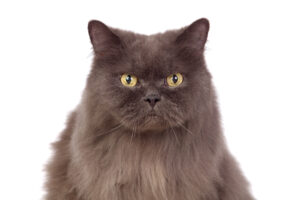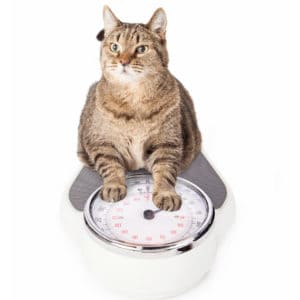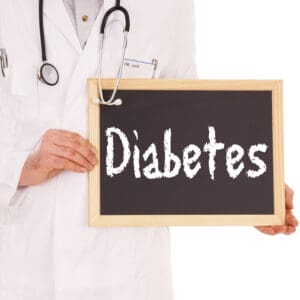 Is your kitty getting gray around the muzzle? Is he less active, energetic, or gaining weight after passing his seventh birthday?Older cats often need different, specialized food to meet their changing dietary requirements. They start to break down food slower, do less exercise, and are at greater risk of putting on weight. With proper nutrition, however, you as an owner can ensure they continue to be happy and healthy every day.
Is your kitty getting gray around the muzzle? Is he less active, energetic, or gaining weight after passing his seventh birthday?Older cats often need different, specialized food to meet their changing dietary requirements. They start to break down food slower, do less exercise, and are at greater risk of putting on weight. With proper nutrition, however, you as an owner can ensure they continue to be happy and healthy every day.
In this article, we’ll review the best cat food for older cats, and we’ll answer all your questions about keeping your senior cat in great shape.
Quick Review: Top – 4 Foods For Senior Cats
What is the Best Senior Cat Food?
When shopping for the best senior cat food, here are a few important thinking points that will help you pick a healthy, age-appropriate formula that meets your cat’s requirements.
- Does your cat need indoor cat food? Indoor cats get less exercise than their outdoor friends, and it often makes them more susceptible to obesity. When your cat is getting on in years, on top of this, a weight management formula may help keep his body mass in check. We’ve reviewed the best dry cat food for senior indoor cats in this article which may help your kitty avoid or prevent diabetes and high blood pressure as part of a balanced diet.
- Does your kitty have a sensitive stomach? If your cat is already prone to vomiting, constipation, or diarrhea, his senior food needs to help him manage these symptoms. Typically, this means a high-fiber diet or cat food with prebiotics. The best cat food for senior cats with sensitive stomachs often contains natural, whole meats, too, while eliminating as many artificial add-ins as possible.
What Should I Look For?
- Specialized formulas aside, there are some basics that every senior cat requires in their diet. These include protein, fats, Omega acids, and all the micronutrients that their bodies need to flourish in their old age.
- Protein is perhaps the most important macronutrient in a cat’s diet – this doesn’t change as your cat ages. There is no reason to reduce the amount of protein in your kitty’s meal plan as he ages, so look out for senior cat food that offers at least 35% protein. Remember, cats are carnivores!
- Fat gives your kitty energy and, like protein, it helps him feel full. Ideally, cat food should contain quality animal lipids such as fish oil, duck fat, or similar. Try to avoid vegetable fats and veggie oils where possible, as these are generally considered inferior to animal fats.
- Few carbohydrates. Some carbohydrates can be very useful to a cat, and fiber is one example. If you want to help your senior cat stay at a healthy weight, however, try not to opt for cat food that contains too many unnecessary carbs. These can contribute to obesity and may not even be digestible for our feline friends.
- Omega acids. Older cats and younger cats alike both need Omega fats in their diets. Flaxseed, fish oil, and egg are great sources of these essential nutrients, and they protect your cat’s skin while nourishing his coat for a sleek, silky feel.
- Probiotics are a wonderful addition to any senior cat diet, as this helps to aid in digestion and promote gut health in your senior cat.
At the end of the day, your cat is unique – but all senior kitties should be eating a diet that is high in nutrients and low in synthetic chemicals. You’ll find a huge range of different flavors, formulas, and more in our Best Senior Cat Food Reviews below, and all from respected brands. Try to choose a food that features lean animal protein as the key ingredient. For example:
- Boneless chicken, deboned duck, or turkey;
- Menhaden fish meal or salmon meal;
- Beef, venison, rabbit, or lamb.
The more natural your cat’s food, the better!
Finding the Best Cat Food for Senior Cats
Now that you know the basics, it’s a good idea to start by asking: wet or dry? If your kitty’s dinner isn’t easy to chew, swallow or digest, even the best senior cat food will go to waste.
Wet or Dry Senior Cat Food?
 Both canned and dry food have their pros and cons for senior cats. If your elderly cat doesn’t have all his teeth – or some are a little loose – they may have trouble crunching up any dry food you serve them. In these cases, it’s best to start your search by looking for the best canned cat food for older cats
Both canned and dry food have their pros and cons for senior cats. If your elderly cat doesn’t have all his teeth – or some are a little loose – they may have trouble crunching up any dry food you serve them. In these cases, it’s best to start your search by looking for the best canned cat food for older cats
In other instances, dry food may be the best choice. If your cat is perfectly fine with biscuits, dry kibble can be cheaper and easier to store in the long run. Unlike canned senior cat food, you won’t need to worry about refrigerating biscuits, and buying dry food can save you money if you’ve got more than one senior cat.
Another option is to purchase dry cat biscuits and soften them yourself, using homemade broth or warm water. This not only makes your kitty’s dinner more manageable but also adds an extra touch of hydration for your best friend.
No matter which diet you choose, it’s important to make sure that your senior cat is adequately hydrated. Make sure to keep an eye out for how often you see your cat at their water bowl. If you feel at any point that they may not be taking in enough water, it may be time to consider a wet food diet to help them get additional hydration.
What to feed an older cat that is gaining weight?
Obesity is a common problem in senior cats, and can lead to medical complications that can threaten their overall health. Carrying around extra weight can put your senior cat at risk, so it’s important to address their obesity as a serious concern.
Before you consider a diet change as a cure for your cat’s obesity, it’s important to make sure there are no other causes for the weight gain in your senior cat. While their weight gain can certainly be due to overeating and lack of exercise, there are medical conditions that can cause weight gain. Once you have ruled out any medical causes, you should then address their diet.
First, it’s important to switch your senior cat to scheduled feedings if they are currently free feeding. Free feeding results in obesity in many senior cats. If your senior cat is overweight, it’s time to switch to scheduled feedings throughout the day. Ideally, you should start with a smaller portion of food that is separated into three daily meals.
In a dry diet, their food should contain at least 28% of protein and less than 15% of fat.
What to feed an older cat that is losing weight?
Though weight gain in senior cats can usually be solved with a change of diet, weight loss in senior cats is a bit more complicated. Sudden weight loss in a senior cat is a cause for concern, and should be addressed by a veterinary professional before you attempt to resolve the problem with a diet change.
Unfortunately, weight loss is a common side effects in several medical conditions that can affect senior cats. Some conditions that can result in weight loss include hyperthyroidism, kidney disease, liver disease, cancer, and gastrointestinal disease.
If your senior cat is beginning to lose weight, make sure to visit your veterinarian for further instructions for their diet and overall care.
Best Senior Cat Food Brands in
After a senior cat food brand that you can trust? Here are some manufacturers that produce good-quality, delicious kibble for your older kitty.
Let us know what your cat likes!
- Blue Buffalo Healthy Aging;
- WholeHearted Grain Free Senior;
- Halo Grain Free;
- Instinct Original Grain Free;
- Nutro Wholesome Essentials;
- Blue Buffalo Wilderness Mature Cat Food; and
- Nutro Perfect Portions for Seniors.
Best Dry Cat Food for Senior Cats
- Blue Buffalo Healthy Aging Natural Mature Dry Cat Food
Pros
- Here’s a holistic formula that includes additional ingredients for older cats, such as chelated minerals;
- Includes plenty of natural dietary fiber and healthy bacteria to promote easier digestion;
- Uses whole grains for energy, such as brown rice and oatmeal;
- Doesn’t use any questionable poultry by-products or any synthetic preservatives; and
- Features DHA – from all-natural fish oil – to look after your cat’s eyesight.
Cons
- Not suitable for gluten-intolerant kitties.
- Halo Grain Free Natural Dry Cat Food, Senior Chicken & Chicken Liver Recipe
Pros
- Starting with real, whole chicken, this recipe is full of quality natural inclusions and even uses non-GMO vegetables;
- This recipe’s fortified with vitamin supplements and natural minerals from chicken liver;
- Halo products never include any milled by-products or meat ingredient meals – just quality ingredients;
- This natural cat food also relies on ethically-sourced wild seafood and responsible farm meat; and
- Includes Omega fats from egg, salmon fats, and delicious flaxseed.
Cons
- It’s relatively high in carbohydrates compared to some other kibbles.
- Solid Gold Furrever Young Senior Cat Food
Pros
- Turkey as a quality lean protein source
- Added chicken fat for beneficial fats for skin and joint health
- Probiotics for digestive health
Cons
- Some reviews mention that the kibbles can be more challenging for a senior cat with teeth issues to chew.
Best Dry Cat Food For Senior Indoor Cats
- NUTRO WHOLESOME ESSENTIALS Indoor Senior Dry Cat Food
Pros
- Authentic tasty chicken encourages your older cat to maintain strong and supple muscles as they age;
- Includes skin- and coat-healthy Vitamin E, which also helps your cat fight off diseases;
- This recipe is 36% protein, perfect for our carnivorous pets!
- Features 3.5% Omega-6 acids, which are ideal for cardiovascular function; and
- Skips all the unnatural preservatives, filler ingredients, and by-products for a healthy, natural meal.
Cons
- Not suitable if your cat isn’t able to eat chicken.
Best Cat Food for Senior Cats with Sensitive Stomachs
- WholeHearted Grain Free Senior Dry Cat Food
Pros
- Features prebiotic bacteria that make digestion easier for your older kitty;
- Includes essential vitamins such as B12, B5, D3, and Vitamin E to nourish and protect kitty’s skin;
- Beginning with fresh chicken, this recipe list is full of healthy, protein-rich ingredients that will help your cat maintain muscle mass;
- Supplemented with zinc, selenium, and other skin-friendly nutrients for a sleek coat; and
- Gives your senior cat fiber with vegetables and fruits such as papaya, carrots, and spinach.
Cons
- Some cat owners have reported that their sensitive stomach cats don’t respond well even to this special formula.
Best Wet Cat Food for Older Cats
- Blue Buffalo Wilderness High Protein Grain Free
Pros
- Includes a generous 8% protein from original chicken;
- Doesn’t use any milled poultry by-products, nor any fake preservatives, dyes, or flavors;
- This gluten-free recipe is perfect for cats with grain allergies – there’s no soy or wheat included;
- Supplemented with minerals such as iron, calcium, and potassium, and vitamins such as B5, B12, D3; and
- Features Omega acids in flaxseed and fish oil, which help your cat’s coat stay silky and sleek!
Cons
- None!
- Instinct Original Grain Free Recipe Natural Wet Canned Cat Food
Pros
- Uses cage-free poultry ingredients for a responsible cat food product that’s full of quality protein;
- It’s versatile, use it as a topper or as a complete meal;
- Crafted here in the USA, Instinct Original is created in facilities with high safety and quality regulations;
- Includes carrots, flaxseeds, and more fiber- and antioxidant-rich items that improve digestibility and immune system function; and
- It contains no soy, potato, or grains.
Cons
- This has quite a high price point.
- NUTRO PERFECT PORTIONS Grain Free Pate Wet Cat Food
Pros
- A super-soft pate makes your cat’s mealtimes much easier, especially if you’ve got a kitty with dental problems;
- It’s made in the States, and comes in handy snap-open packets for a quick serving;
- Chicken is the key meat ingredient, and the flavor of this recipe is further enhanced with hydrating chicken broth;
- Uses natural sources of glucosamine to protect your best friend’s joints; and
- It’s made with ethical GMO-free ingredients for a holistic, wholesome dinner.
Cons
- It’s slightly more costly than dry cat biscuits.
FAQ
When should I switch to senior cat food?
All cats are different, but as a general rule – seven years old. There are other signs to look out for when your cat reaches this approximate age, including the following:
- Dental issues – If your cat has loose, broken, or missing teeth, take them straight to a vet. A professional will likely recommend the best wet cat food for older cats, which is easier for them to chew and digest.
- Less active – Senior cats may not be as active as they once were, which could be down to arthritis, obesity, or plain old tiredness. If your kitty isn’t getting as much exercise as before, they can be prone to weight gain and may need a senior formula with fewer calories per serving.
- Digestive problems – If your cat has passed the 7-year mark and suffers from issues such as vomiting or runny stools, they may require food for older cats. Ask your vet for advice.
In general, cats do not live past the age of 20 years old. Once they are around seven, they may require a special senior diet.
Are senior cats more likely to develop diabetes?
If your older cat is less active and gaining weight, they may be at risk of diabetes. Don’t worry too much, however, because the right diet and a good amount of exercise are often enough to manage or even prevent the condition. If you are worried about feline diabetes, take your pet to a veterinarian. Look out for the following symptoms:
- A loss or increase in your cat’s appetite;
- Throwing up or regurgitating food;
- Tiredness, lethargy, or weakness;
- Difficulties walking or moving around;
- Heightened urination and increased thirst; and
- Weight loss or weight gain.
You’ll also find a huge range of excellent dietary options in our article: What’s The Best Cat Food for Diabetic Cats?
Helpful Links
- https://www.avma.org/public/PetCare/Pages/Caring-for-an-Older-Pet-FAQs.aspx
- https://vetnutrition.tufts.edu/2016/03/when-should-i-switch-my-pet-to-a-senior-diet/



